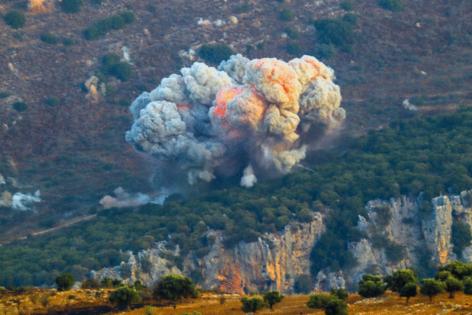Israel intensifies barrage of Lebanon, killing 182 people
Published in News & Features
Israeli warplanes pounded towns and villages in Lebanon on Monday, conducting airstrikes on what the Israeli military said were more than 300 Hezbollah targets.
Lebanese health authorities said more than 182 people were killed and at least 720 injured, including women, children and rescue workers.
Monday's barrage was a notable uptick in the past year of fighting between Israel and Hezbollah, the Iran-backed Lebanese Shiite paramilitary faction and political party.
It comes as Israeli leaders announced a "new stage" in their fight against Hezbollah, with the aim of pushing Hezbollah forces away from the border to allow the return of Israeli residents to the country's north.
In response, Hezbollah lobbed dozens of rockets into Israel, some reaching as far as Haifa. Hezbollah said it was targeting military bases and a weapons manufacturing company.
Ahead of the Israeli strikes, residents across Lebanon reported receiving phone calls on landlines and SMS messages with warnings from the Israeli military to stay away from buildings or areas where Hezbollah was hiding or deploying weapons. Those who received phone calls in Beirut said they heard a prerecorded message with someone speaking with an Egyptian accent. Ogero, the country's state-owned landline operator, said its systems detected some 80,000 attempted calls that were suspected to be Israeli.
Others reported the same message broadcast on Lebanese radio.
One recipient of a phone warning was the office of Lebanese Minister of Information Ziad Makari, who dismissed the warnings as part of Israel's "psychological war."
The Lebanese Health Ministry suspended all non-urgent surgeries so as to make space for treatment of the wounded. Abbas Halabi, Lebanon's caretaker education minister, ordered all schools closed for Monday and Tuesday in the south of Lebanon, the Bekaa Valley and the southern suburbs of Beirut, where Hezbollah has a dominant presence. Later, Lebanese Health Minister Firas Abiad issued a statement ordering all nurseries in Lebanon to close on Tuesday.
Meanwhile, an exodus began from the country's south, with motorists reporting extensive traffic jams on the main coastal highway toward Beirut. Social media was deluged with people trying to find or rent accommodation in Lebanon's north.
The air campaign comes after a bruising week for Hezbollah. On Tuesday and Wednesday, the group suffered a double wave of attacks that that saw thousands of pagers and walkie-talkies explode, leaving 39 dead and thousands of Hezbollah fighters, officials and administrators maimed and incapacitated.
The attacks were widely attributed to Israel, which did not claim responsibility.
On Friday an Israeli airstrike hit a residential compound in Beirut's southern suburbs, killing a top Hezbollah commander and 15 of its special forces leadership, along with more than double that number in civilians. Nine people remain missing, according to Lebanon's civil defense.
Israel is gambling that the escalation will force Hezbollah to suspend its rocket campaign, which the group started on Oct. 8, one day after Hamas' assault on southern Israel and the fierce Israeli bombardment on Gaza that followed. Hezbollah said it attacked Israel in solidarity with Palestinians in Gaza.
Since then, Israel and Hezbollah have engaged in a near-daily exchange of fire across the Lebanese-Israeli border. The fighting has displaced some 110,000 people in Lebanon, and approximately 60,000 in northern Israel, leaving both sides of the border depopulated.
Israel accuses Hezbollah of installing rocket launchers and other weapons inside homes and residential neighborhoods in southern Lebanon.
"As a result," said IDF spokesperson Daniel Hagari, Hezbollah has "turned southern Lebanon into a battlefield."
Shortly before 3 p.m. local time, the Israeli military's Arabic-language spokesman Avichay Adraee posted a message on X informing residents in the Bekaa valley in southern Lebanon who live "inside or near a house containing Hezbollah weaponry" that they had two hours to move 1,000 meters outside their village or head to a "central school close to you," and not return until further notice.
Hezbollah officials say they have no intention of stopping until a cease-fire is forged in Gaza. On Sunday, deputy leader Naim Qassem said the group was now in an "open-ended battle of reckoning" with Israel and that the group was ready for "all military possibilities."
"The support front will continue no matter how long it takes until the war on Gaza stops," Qassem said.
©2024 Los Angeles Times. Visit at latimes.com. Distributed by Tribune Content Agency, LLC.







Comments